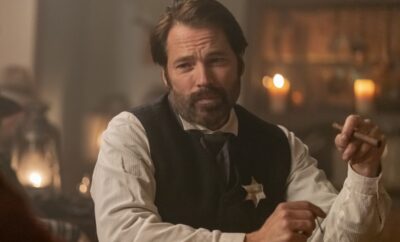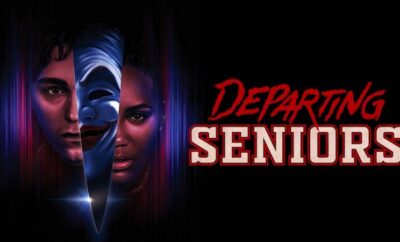Features
WayHaught: Finding A Fairytale
By: Kelsey Juntwait
Don’t we all have that one character on television that we see the most of ourselves in? Whether it’s their strength or struggle, we all find something to latch onto, to follow, to believe in. Imagine turning on the television and the character you saw the most of yourself in, the character who gave you a sense of hope, was cowardly ripped away from you and killed off. Imagine the reason that character was ripped away from you was because of the one thing that related you the most to them. This character that so brilliantly represented you is now gone. It doesn’t end here, though. Now, tons of characters that represented that one part of you are being killed. You are watching yourself die on that screen, over and over again, time after time, week after week. At what point would you begin to value your life any less? At what point do you question your purpose here? At what point do you give up?
People in all aspects of life are waking up every day and fighting a battle. They’re trying to figure out who they are in this world, whom they can trust and to whom they can talk. Day by day and series by series, queer characters infiltrate television shows and offer an escape from reality and a glimmer of hope for viewers identifying as LGBTQ+. These stories provide a world in which judgment can be overcome and every type of love is treated as the absolute magic it is. A fairy tale ending exists in which TWO queens reign.
TV writers and showrunners need, more than ever, to bury this discouraging trope. This pattern of storytelling is not only unsustainable, but outrageously predictable and can turn toxic with overexposure. Everyone needs a fairytale to aspire to and everyone should believe they deserve one.
Just as viewers were losing grip of drained hope and broken promises, things got suspiciously hot on “Wynonna Earp,” a series based on the same named comic book written by Beau Smith that was only made better by the phenomenal vision of the showrunner, Emily Andras. This show draws an eccentric picture of two sisters struggling to deal with an unfortunate family curse and the consequences of their grandfather’s past. While Wynonna Earp (Melanie Scrofano), a leather wearing, confidence lacking 27-year old is sending demon revenants back to hell, her lace loving, light hearted sister, Waverly Earp (Dominique Provost-Chalkley), is questioning her sexuality and facing her own demons after a flirtatious introduction to the local police officer, Nicole Haught (Katherine Barrell). Originally premiering on April 1, 2016 and just getting picked up for a second season after a ruthless push from the fandom on Twitter, the authentic stories told in “Wynonna Earp” are going against all gender and sexuality norms and they’re having one hell of a time doing it.
Back in the Earp’s hometown of Purgatory, Wynonna is experiencing an unconventional ‘coming of age’ story that fills a much needed genre gap in television, where the badass hero isn’t the poised girl she’s always cracked up to be. Waverly’s story is filling its own gap where sexuality and curiosity don’t always result in heartbreak or death. Gay and straight viewers alike can identify with the reality of these rebellious female leads and we’re all wondering why it’s taken so long for these stories to be told.
What first began as an awkward introduction; Waverly immediately smothering the initial spark that Officer Haught offered, it wasn’t long before she knew this spark couldn’t actually be contained. Viewers latched on to the truth of this all too real relationship, where unwanted chemistry between two people can never be ignored. The internal battle that ensues takes Waverly on a ride of self doubt and questioning that ultimately causes her to take hold of her own happiness. The honesty in Waverly’s struggle is highlighted by the confidence and determination of Nicole, creating a relationship so tangible to viewers that their journey is not only seen but felt. Through the season, you’re taken on an emotional roller-coaster as the two experience loss, longing, heroism, self-realization and surrender that results in magnetic chemistry. Beginning as an innocent flirtation, Waverly and Officer Haught quickly started heating up the show and fans swore newfound fealty to the ship that became “WayHaught.”
It came as no surprise when the introduction of this relationship was first questioned. Queer death was a theme this year in television and fans began to anticipate it. It didn’t start here, though. The infamous and outrageous beheading of the title character in “Xena” (Lucy Lawless) in 2001 and Tara’s (Amber Benson) death by stray bullet in “Buffy the Vampire Slayer” in 2002 go down as two of the most memorable. Back to 2016, Denise (Merritt Wever) on “The Walking Dead” gave a fresh meaning to the word, “bullseye” when she took an arrow through the eye. “Blindspot’s” devoted boss, Mayfair (Marianne Jean-Baptiste), was shot in the back. “Empire” one upped the rest by killing off both Mimi (Marisa Tomei) and Camilla (Naomi Campbell) in one episode while a variety of network shows continued the trend.
After this community was robbed all year of their ability to trust, devastation was unfortunately expected. When Emily Andras assured fans “they are both very much alive” by the end of the first season in an interview with AfterEllen, relief was felt worldwide. Andras understands the negative impact this trope has and is doing her part to change it. Some writers claim that more LGBT representation on television means more exposure, more drama and, ultimately, more death and if viewers aren’t okay with that, then representation shouldn’t exist at all. Andras isn’t buying it though. She makes the point that writers “just have to be a better storyteller,” and fans across the world are hailing her as the best storyteller of them all. To further the importance of this relationship and to defy a trope so overused in the media, the writers eased any lurking skepticism by having both girls take a bullet and live to tell the tale. It seems that WayHaught is, in fact, bulletproof and something the queer community has craved and deserved for so long.
“Wynonna Earp” has done what other shows have not this year: it’s given an entire community hope where they can watch themselves on that screen, week after week, and not fear the ending. It has given fans the reassurance needed to value their lives as everyone should, to believe their purpose here, and to never – under any circumstance – give up. Defying conformity, WayHaught is giving queer viewers a love between two characters that is not only alive and well, but destroying everything we once knew about stereotypes. We see that the dual queen fairytale ending is possible and it starts in Purgatory. While we wait for the much anticipated stories of Season Two, we can take pleasure in knowing that “Wynonna Earp” went against all odds in its first season, sending demon revenants and tired tropes alike back to hell where they belong.





You must be logged in to post a comment Login